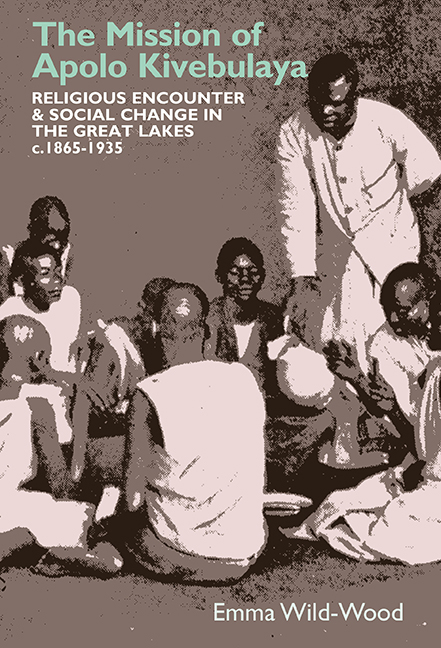Book contents
- Frontmatter
- Dedication
- Contents
- List of Maps and Photographs
- Acknowledgements
- Note on Orthography and Glossary
- Timeline
- Introduction: Kivebulaya and religious change in the Great Lakes
- 1 The afterlife of Saint Canon Apolo (1933 onwards)
- 2 Waswa, a commoner in the Kingdom of Buganda (c.1865–c.1884)
- 3 Munubi, a foot soldier in battle and evangelism (c.1884–1895)
- 4 Itinerant teacher ‘from Europe’ in Toro (1895–1905)
- 5 Clerk in holy orders (1905–1915)
- 6 To all Ituri nations under Belgian rule (1915–1925)
- 7 Reverend Canon Apolo, elder and churchman (1925–1933)
- Conclusion: African missionaries, religious encounter and social change 270
- Sources
- Index
- EASTERN AFRICAN STUDIES
5 - Clerk in holy orders (1905–1915)
Published online by Cambridge University Press: 30 April 2020
- Frontmatter
- Dedication
- Contents
- List of Maps and Photographs
- Acknowledgements
- Note on Orthography and Glossary
- Timeline
- Introduction: Kivebulaya and religious change in the Great Lakes
- 1 The afterlife of Saint Canon Apolo (1933 onwards)
- 2 Waswa, a commoner in the Kingdom of Buganda (c.1865–c.1884)
- 3 Munubi, a foot soldier in battle and evangelism (c.1884–1895)
- 4 Itinerant teacher ‘from Europe’ in Toro (1895–1905)
- 5 Clerk in holy orders (1905–1915)
- 6 To all Ituri nations under Belgian rule (1915–1925)
- 7 Reverend Canon Apolo, elder and churchman (1925–1933)
- Conclusion: African missionaries, religious encounter and social change 270
- Sources
- Index
- EASTERN AFRICAN STUDIES
Summary
Introduction
By the mid-1900s Kivebulaya was the senior African clergyman at Kabarole. He had a comfortable standard of living. He felt at home among the Batoro and wanted to become one of them. He had been given the pet name (empako) ‘Apuli’, without which a person is marked as a stranger from the first greeting and, although his Luganda accent could not be concealed, he was, in the words of one CMS missionary, ‘so devoted to the people as to desire to be regarded as naturalised’. Kivebulaya grew up when a modern Ganda identity was emerging but his own sense of self was not fixed there. In contrast to other Baganda teachers and traders who left the kingdom when the Batoro expressed their resentment of Baganda political involvement, Kivebulaya showed his commitment to Toro by translating biblical texts into Runyoro-Rutoro. He had translated St Matthew's Gospel from the Luganda version during his time in Mboga, writing whilst lying on the ground by the fire at night. In 1900 he wrote, ‘I want with all my heart the Old and New Testament in Lunyoro (sic)’. Kivebulaya engaged in the missionary task of inhabiting local thought-forms and of gaining fluency in a vernacular language. Language proficiency was not simply about communication. Missionaries also considered that it enabled the inner transformation that they required of themselves: ‘our hearts … must be one with the hearts we seek’. Kivebulaya deployed empathy and insight to persuade his hearers to change their behaviour in line with the reform introduced by the CMS and the Protestant rulers of Toro.
This chapter examines Kivebulaya's role as senior clergyman within the growing Native Anglican Church, his mediation between the mission station in Kabarole and its satellite stations, and his support of the reform of social behaviour and the emerging social order through his collaboration with CMS missionaries and Omukama Kasagama. It ends with his advocacy for Bible translation as an agent for spiritual and social change and the political directions in which others took his translation. The chapter shows three things: Kivebulaya's role in the development of the Kabarole mission and the Toro kingdom; his involvement in a project of social reform that emerged from the close connection between mission and kingdom; and, finally, the distinct emphases that emerged from social reform as shown in the priorities of Kivebulaya and Kasagama.
- Type
- Chapter
- Information
- The Mission of Apolo KivebulayaReligious Encounter & Social Change in the Great Lakes c. 1865–1935, pp. 164 - 202Publisher: Boydell & BrewerPrint publication year: 2020



